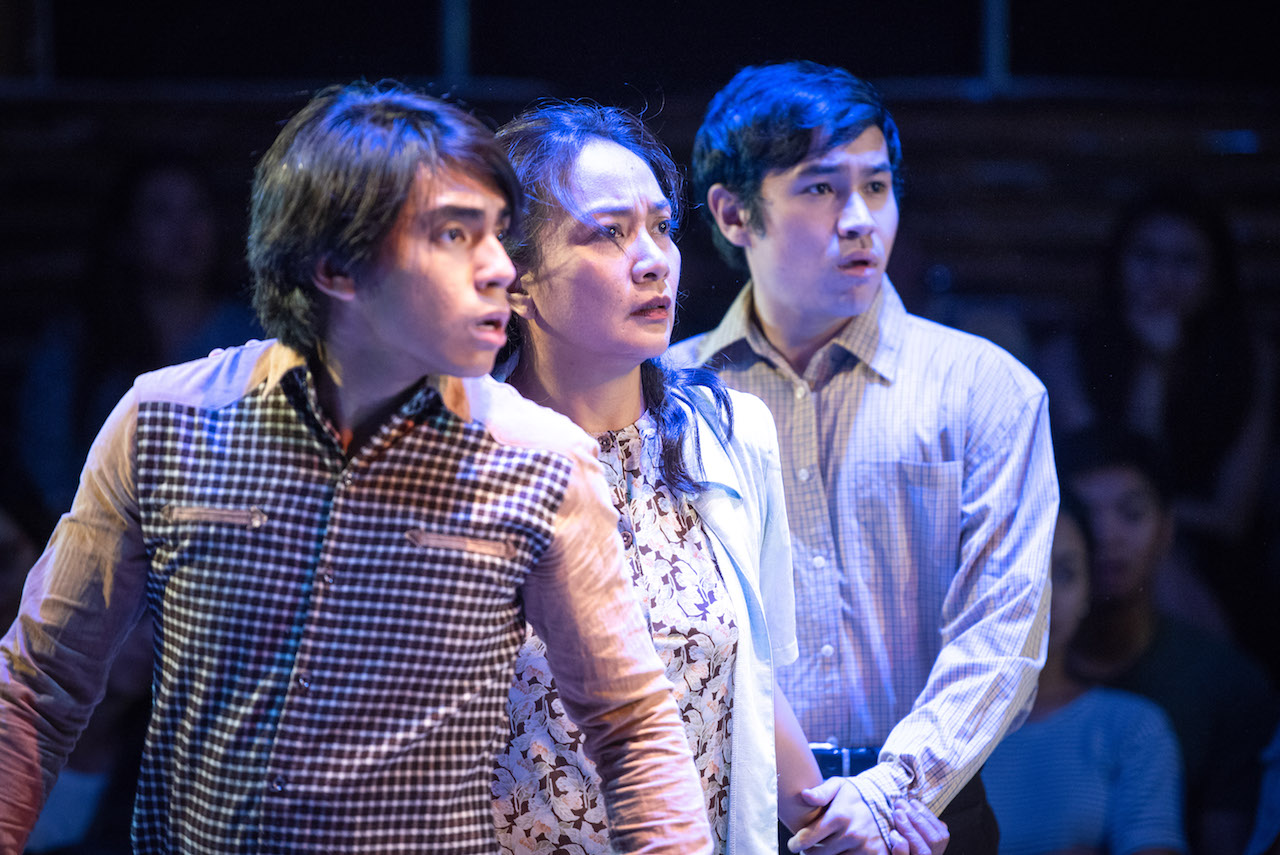
REVIEW: “Dekada ‘70” is a powerful, respectful adaptation
The infamous Martial Law wasn’t curtailed solely against the ‘Reds’, communist insurgents in staunch opposition of the dictatorship. No—it wasn’t selective at all, to say the least. Everyone, from the struggling working class to the intellectual ‘burgis’, bore witness to and were victimised by the malevolent military rule. Dekada ‘70 shows this other side of the same coin, powerfully and respectfully adapted to the stage by Pat Valera.
Picking up speed
The show begins with the ensemble emerging from one end of the stage towards an auto-tuned microphone at the other. Everything is barely comprehensible at first, which is probably how it felt like in the midst of the Marcos reign.
But, it picks up, almost immediately, as three of the best performances in theater this year took the reins: Jon Abella (as Jules Bartolome), Juliene Mendoza (as Julian Bartolome), and the show’s gem, Stella Cañete-Mendoza (as Amanda Bartolome).

Juliene Mendoza as Julian; photo by Vlad Gonzales
The show isn’t averse to pointing out the hyper-machismo characteristic of the era, through Julian Bartolome and his five boys. “It’s a man’s world!” they simultaneously (and crassly) chanted at the dinner table, as Amanda remained silent in submission.
Yes, the show also tells of these six men, in their pursuit of independence, love, and political ideology—all while upholding the toxic patriarchy. But this isn’t just their story to tell. In fact, everything revolved around the Bartolome matriarch; Stella Cañete-Mendoza moved everyone to tears with her well-crafted portrayal of Amanda. The narrative was with her all throughout—through birthing pains, helplessness, and grief.
It was her eventual self-redemption from her own helplessness which proved most powerful. This was made even stronger given her circumstance: as a mother, a wife, and a woman more than anything, in the face of a violent dictatorship and a condescending patriarchy.

Jon Abella sa Jules, Stella Canete Mendoza as Amanda; photo by Vlad Gonzales
Disconnect in design
The show faithfully chronicles Martial Law from a bourgeois standpoint—that of the Bartolomes. Everything from every pair of vintage bell bottoms to each broadsheet issue scream of the turbulent 70’s.
However, there’s a disconnect here. Jagged aluminum roof panels which were hung on the walls doesn’t reflect the privileged Bartolome household. The nearly empty rectangle which served as the stage, naked scaffolding on both ends, barely echoes the milieu. Almost as if the stripped-down set was made to highlight something else: Meliton Roxas Jr.’s brilliant lighting design (with every color cherry-picked to accentuate the mood, and every spotlight meticulously mapped across the bare stage). In spite of a panoramic set, Roxas made the actors easy to follow with his commanding lighting direction.

Esteban Fulay as Em; photo by Vlad Gonzales
Transcendent power
Despite being a period drama set more than four decades ago, the show is unabashedly millennial in sensibility, particularly evident in Pat Valera and Matthew Chang’s music. His and Chang’s compositions didn’t dilute the show’s power in any way, but only added another meaningful layer to an already complex narrative.
Lualhati Bautista’s Dekada ‘70 is a strong political and feminist piece, which has successfully transcended multiple forms of media (first, film, and now, theater) without losing its essence. It presented how a middle-class family struggled under the oppressive Marcos dictatorship, all lensed through the viewpoint of a mother—a woman—Amanda Bartolome.
Valera’s adaptation remained sensitive and true to the material, essentially retaining its power as political protest. With a similarly, if not more, powerful ensemble, the show sincerely (and triumphantly so) sings of freedom and emancipation—of children, of women, of a nation.

